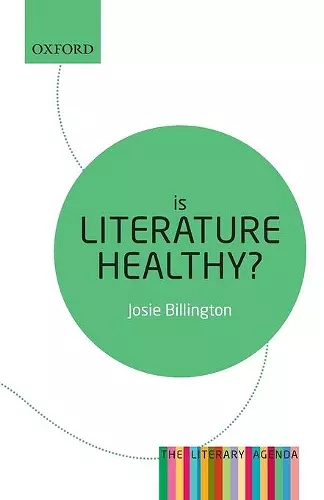Is Literature Healthy?
The Literary Agenda
Format:Paperback
Publisher:Oxford University Press
Published:29th Sep '16
Currently unavailable, and unfortunately no date known when it will be back

The Literary Agenda is a series of short polemical monographs about the importance of literature and of reading in the wider world and about the state of literary education inside schools and universities. The category of 'the literary' has always been contentious. What is clear, however, is how increasingly it is dismissed or is unrecognised as a way of thinking or an arena for thought. It is sceptically challenged from within, for example, by the sometimes rival claims of cultural history, contextualized explanation, or media studies. It is shaken from without by even greater pressures: by economic exigency and the severe social attitudes that can follow from it; by technological change that may leave the traditional forms of serious human communication looking merely antiquated. For just these reasons this is the right time for renewal, to start reinvigorated work into the meaning and value of literary reading. Medical Humanities comprises disciplines as diverse as literature, the visual and performing arts, the history of medicine, bioethics. It claims a vast range of philosophical and political agendas, goals and purposes, including the education of medical students in areas of clinical empathy, critical thinking, ethical awareness, gender and race issues and cross-cultural medicine. Josie Billington argues that in so far as literature is offered as adding value to medical education in health training and practice, that defence tends to become instrumental in nature, whether consciously and explicitly, or otherwise. This book is interested, more widely, in the power of the arts as a remedial force. Following an introduction surveying the idea of the Medical Humanities, its history, and its development, the book's four chapters will look at illness and health as defined in medical terms and as complicated within the field of imaginative literature; at narrative and storytelling within the therapeutic meeting of medical and literary approaches; at reading groups and private reading, considering contemporary models of literary reading as a template for redefining literature's place and power not only within the discipline of Medical Humanities but within the wider world in relation to concerns of mental wellbeing that affect us all.
A very thorough and convincing account contributes a highly original, succinct and probing analysis of how literature might be reconceptualised as an aid to turn to in times of human struggle and difficulty. * Emily Chester, British Society for Literature and Science *
A clear-eyed account of the use of literature and reading groups in therapeutic and clinical settings ... Yet her book stands out because it resists the funding-friendly notion that literature can be "prescribed" to make people feel better -- that it is just "cheerily uplifting". Instead, she argues that the "good moments" brought about by reading occur because there are no "set aims and outcomes". * Christina Petrie, Times Literary Supplement *
we desperately need more books like Billington's that address us quietly and clearly, about something very basic. Literature and the literary have lost their cachet in our field. If you want to know why it should be restored, read this book. The case could not be better made. * Neil Vickers, BMJ blog *
The medical humanities have become more complex and more theoretically savvy over the years. But we desperately need more books like Billingtons that address us quietly and clearly, about something very basic. Literature and the literary have lost their cachet in our field. If you want to know why it should be restored, read this book. The case could not be better made. * Dr Neil Vickers, Medical Humanities *
ISBN: 9780198724698
Dimensions: 195mm x 136mm x 9mm
Weight: 168g
160 pages